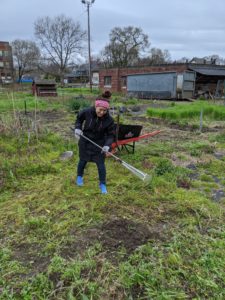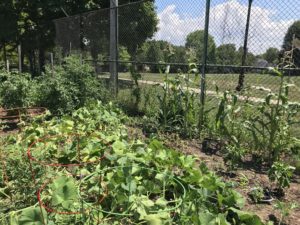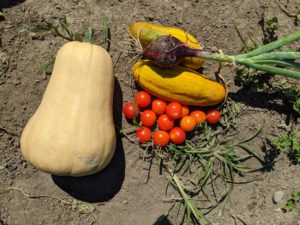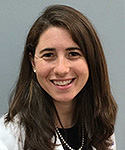August 19th, 2020
Residency Reflections from an Intern Gardener
Stephanie Braunthal, DO
Starting Our Garden
Last year, my boyfriend asked if I wanted to join a community garden. As he handed me the paperwork, he said he would be the “primary,” I would be listed as a “helper,” and for only $10, we could grow our own vegetables. Distracted by whichever rotation I was on, I agreed without much thought, assuming that “helping” would be something similar to a community service project. To me, a garden was some sort of greenery that already existed, occasionally needed upkeep, and in this case, would result in a crop-share. Needless to say, I was a bit confused about his fixation on choosing seeds and pre-planning the garden. I was even more surprised when we walked over on a misty mid-March afternoon, arrived at an overgrown 10 x 10 foot plot, and was told we needed to start weeding by hand.

Community gardening has provided a welcome source of activity and [distanced] socialization during the COVID-19 era. It has also inspired much reflection at a pivotal time in my career: the start of the pandemic, the end of residency, and the transition to chief resident responsibilities. Naturally, I have drawn parallels between them all.
Gardening (and Residency Training) Best Practices
To begin, like in medicine, best practices in gardening are hotly debated and change over time. As gardeners prepared their soil in March and April, they had seemingly endless conversations about the risks and benefits of tilling the soil, a practice that can be both beneficial and disruptive to soil health. My only contribution was telling the gardeners that they sounded like my fellow internists, grappling with whether the updated hypertension and aspirin guidelines could be applied to all of their patients, or to only those who were similar to the cohorts studied in the landmark trials. For those curious, we lightly tilled this year, added leaves to increase the organic matter, and will be doing “no-till” for the future. I am still not sure which strategy is the standard of care.
With our newly enriched soil, we were ready to plant. We had packets of seeds, shoots to transplant from one of my co-chiefs, and numerous gardening books from family members. We followed the instructions about depth, distance, and watering frequency. Then, we realized that, like patients, plants do not follow the textbooks. Similarly, their outcomes rely heavily on their environment. For example, our five kale plants were growing at equal rates for the first few weeks until the butternut squash vines took over a third of the plot and started blocking the sun. Then, the kale plant that had the most sunlight and rain grew the largest, and the others have been lagging behind, only to grow when we move the leaves out of the way. Competing weeds initially suppressed the carrots; once they were removed, the carrot stems shot right up. On the other hand, the corn, squash, and tomatoes have grown in spite of everything.
Structure Affects Function
A principle that is fundamental, but not unique, to medical education is that structure affects function. An example from residency that stands out is how adjusting one of our subspecialty rotation’s call schedules garnered better continuity of care, which ultimately engendered improved resident performance and morale. Even within our first month, my co-chiefs and I have observed residents’ successes and struggles. We are learning how to optimize our program’s infrastructure so that it can benefit a diverse group of learners. Just as my boyfriend and I figure out how often to water, weed, pare down, and transplant, my chief group is recognizing how to appropriately intervene and when to implement systemic change.
 One of the most valuable aspects of starting this garden at the beginning of my chief term has been the unique opportunity to revisit the uncertainty, vulnerability, and insecurity that accompanies being a new trainee. In the garden, I am the intern, or maybe even the first-year medical student, navigating a new environment and grasping the vocabulary of an entirely foreign vocational language. My boyfriend and I constantly ogle our neighbors’ more aesthetically pleasing plots. Until recently, we assumed that others had years, if not decades, of experience. Much to our surprise, some of them only started last year. The imposter syndrome reminds me of being an intern, when becoming as knowledgeable or efficient as a senior resident seems like an unattainable dream. Yet, I can see the same pride from these new second-year gardeners that I do in our new seniors, and that I did in myself, realizing that they can independently manage a team and care for patients in a way that they did not think was possible a year earlier.
One of the most valuable aspects of starting this garden at the beginning of my chief term has been the unique opportunity to revisit the uncertainty, vulnerability, and insecurity that accompanies being a new trainee. In the garden, I am the intern, or maybe even the first-year medical student, navigating a new environment and grasping the vocabulary of an entirely foreign vocational language. My boyfriend and I constantly ogle our neighbors’ more aesthetically pleasing plots. Until recently, we assumed that others had years, if not decades, of experience. Much to our surprise, some of them only started last year. The imposter syndrome reminds me of being an intern, when becoming as knowledgeable or efficient as a senior resident seems like an unattainable dream. Yet, I can see the same pride from these new second-year gardeners that I do in our new seniors, and that I did in myself, realizing that they can independently manage a team and care for patients in a way that they did not think was possible a year earlier.
Growing Confidence
It is now early August, and we are starting to reap the fruits of our labor. The garden is growing on me. Although I wax poetic about the reflections it has inspired, the reality is that I was not enjoying it until I began to understand how and why things are done. Aside from a delayed appreciation for anatomy lab, I initially could not think of a parallel feeling during my medical training… then, I remembered I almost quit before it even began. Midway  through sophomore year of college, I had a sudden insecurity that I would not be able to get into medical school, which took the joy of learning out of any pre-med class that I was taking. I decided to take a semester to explore the myriad other intellectual avenues offered at small liberal arts colleges, later stressed about finishing the pre-med requirements before graduation, and subsequently enrolled in two biology and chemistry summer courses at a university closer to home. Whether it was a different teaching style, living with my family, or the exhilaration of being in a new school, something clicked. I left for study abroad confident in my ability to become a physician and returned to college that spring, eager to jumpstart the rest of my career. As for many in medicine, my journey has since been filled almost daily with peaks and troughs. Harnessing the reinvigorating moments has kept me going; the desire to teach others how to do so is part of what inspired me to become a chief resident. I look forward to the day I can bring some homegrown vegetables to guide the conversation.
through sophomore year of college, I had a sudden insecurity that I would not be able to get into medical school, which took the joy of learning out of any pre-med class that I was taking. I decided to take a semester to explore the myriad other intellectual avenues offered at small liberal arts colleges, later stressed about finishing the pre-med requirements before graduation, and subsequently enrolled in two biology and chemistry summer courses at a university closer to home. Whether it was a different teaching style, living with my family, or the exhilaration of being in a new school, something clicked. I left for study abroad confident in my ability to become a physician and returned to college that spring, eager to jumpstart the rest of my career. As for many in medicine, my journey has since been filled almost daily with peaks and troughs. Harnessing the reinvigorating moments has kept me going; the desire to teach others how to do so is part of what inspired me to become a chief resident. I look forward to the day I can bring some homegrown vegetables to guide the conversation.




As your parent I am humbled to learn so much from your writing. It sparks memories of some of these moments you have mentioned.
Bravo! I look forward to new articles in the future.
Thank you. I come from a family of great writers. Lots of inspiration to draw on!
A really insightful piece about what it is like to be a new resident and how to lead a group of people with different backgrounds. I am looking forward to reading more of Dr. Braunthal’s blogs throughout the 2020-21 year.
Thanks! Looking forward to more inspiration, from the garden and otherwise, throughout the year.
Thank you.
Very useful analogies between growing veggies and growing doctors. Very heartwarming to hear about your experiences.
A nice distraction from our calamity-filled world now – to hear about something as mundane as plant growing. And that some principles in life are over arching between disciplines.
Hope the fruits of your labors were tasty !
Thank you! Those that have been successful have been tasty so far. Appreciate the kind words.
Such a pleasant surprise to read this commentary with such clever analogies from a member of our family both personally and professionally
Thanks Barb! This was a great surprise to see your comment!
You’re such a great person Dr. Braunthal. You have the incredible gift of communication and I love the article. “The garden is growing on me”… hey oh, I see what you did there :)!
Congratulations to NEJM for getting such a talented doctor to share her experiences and insights. Looking forward to reading the next one as well.
Thanks Matt! I actually wrote it without the pun in mind, and then realized it definitely worked 🙂 Look forward to writing more!
Congratulations on your first post, Stephanie!
It hits home the idea of that which is created with hope, labor, and love surely bears sweet fruit. And isn’t residency the same in so many ways?!
I often found myself coming home after 24-hour shifts and tending first and foremost to my plants. Genuinely caring for people and things outside of yourself is a powerful force of resilience and growth.
Thank you, Sneha! It definitely is the same in so many ways, though I didn’t have plants at home to tend to (until this year). I think my co-residents who did felt similar to you.
Looking forward to reading your posts soon!
Love your first post Stephanie! Especially nice to see the parallels you make re: higher order thinking, confidence, mentorship and growth. Learning how to learn is a whole theme unto itself!
Thank you, Vivek! I just had a chance to read yours, and love how you also comment on learning how to learn as the responsibility of the teacher.
Absolutely enjoyed reading your first post Stephanie! It’s amazing how you related gardening and medicine. You inspired me to get my own plant ☺️ and I will let you know how I do caring for it.
Thank you, Masood! Look forward to hearing about the progress of your garden 🙂